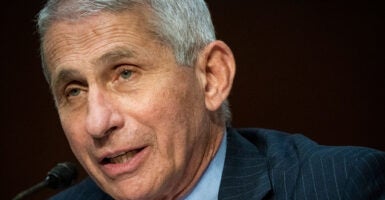Dr. Anthony Fauci, who directs the National Institute of Allergy and Infectious Diseases, said in a radio interview that going back to school during the coronavirus pandemic may be a good idea for children.
“If you keep children out of school, the unintended negative ripple-effect consequences can be profound with regard to what the parents do,” Fauci said Wednesday during a SiriusXM program hosted by Dr. Marc Siegel, a physician and associate professor of medicine at the NYU Langone Medical Center.
“Stay off from work to be able to take care of their children, what about child care?” Fauci asked. “What about children who rely on schools for their lunch? Maybe the most important nutritional meal that they’ll get.”
>>> What’s the best way for America to reopen and return to business? The National Coronavirus Recovery Commission, a project of The Heritage Foundation, assembled America’s top thinkers to figure that out. So far, it has made more than 260 recommendations. Learn more here.
Fauci, a member of the White House coronavirus task force, said that not allowing children to go back to school has significant ramifications.
“Within the context of doing whatever you can to safeguard the health and welfare of the children, we should try to get the schools open,” he said.
Siegel, also a Fox News Channel medical contributor, said on “Tucker Carlson Tonight” that it was good to hear Fauci speak positively about reopening schools this fall.
“I was so glad to see Dr. Fauci finally taking that position,” Siegel told Carlson. “When you consider the position that we need to take is ‘We are opening the schools,’ how do we go about doing it, what guidelines can help us? Not the guidelines getting in the way of it.”
Siegel said clarified guidelines expected next week from the Centers for Disease Control and Prevention “may be more personal” and “maybe they will actually work.”
New COVID-19 cases in America reached record highs by climbing to about 50,000 a day, USA Today reported Monday.
About 3 million Americans have contracted the virus and more than 130,000 have died, data from Johns Hopkins University shows.































